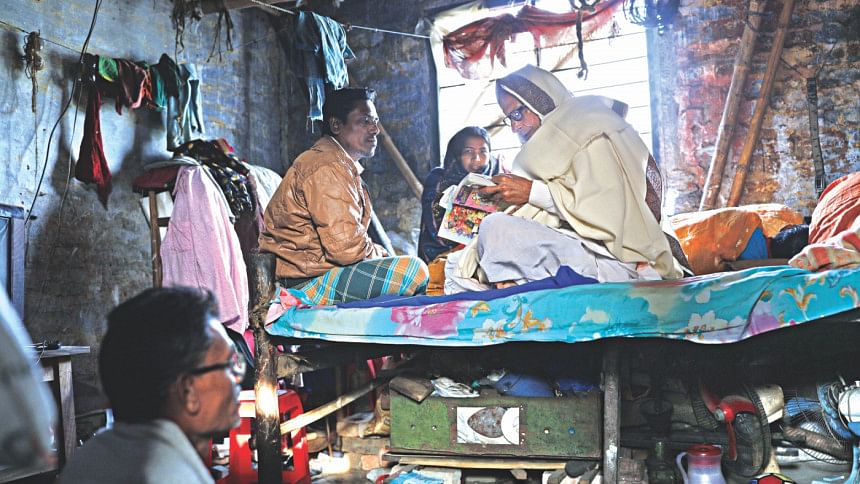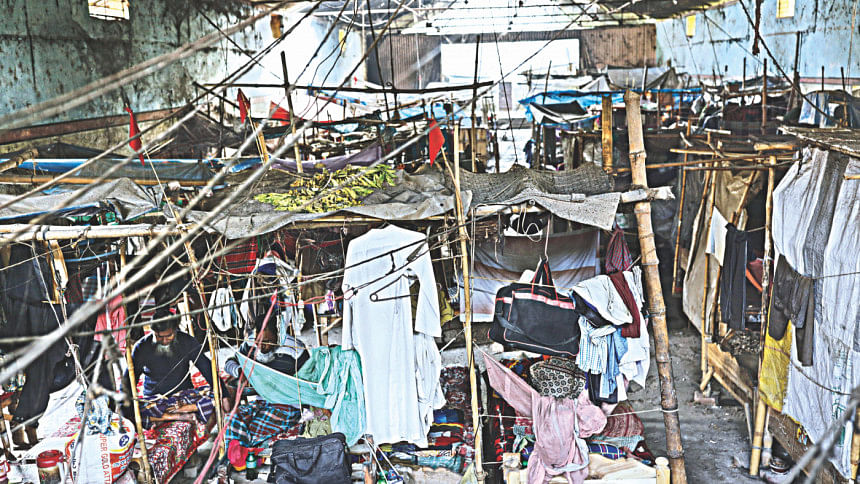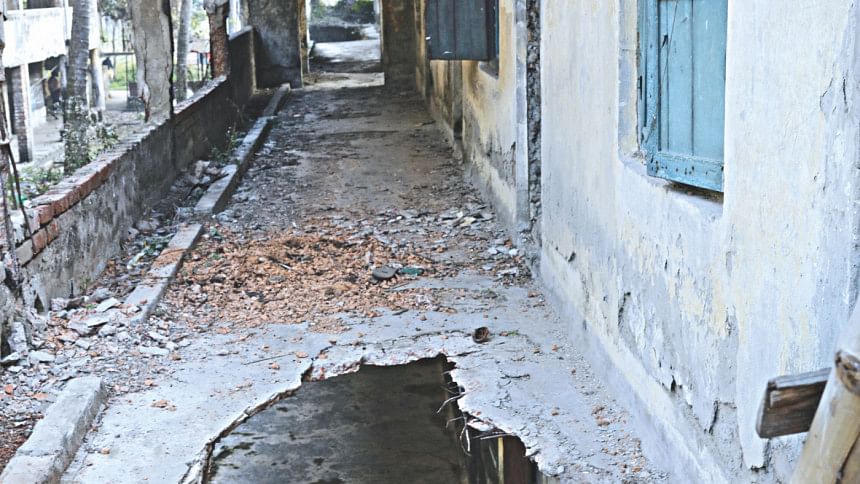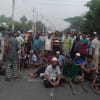Up against the wall

“Take our dead bodies, give us our money back”, “We want to eat, we want to live”, “Give us food or we shall eat the constitution” -- these are the slogans imprinted on banners hanging all over Khalishpur.
This part of Khulna city is host to nine state-run jute mills.
The banners were hoisted by workers of these jute mills during their recent weeks-long protests demanding unpaid wages and other financial benefits. The protesting workers say they have not received wages for at least six weeks, and retired workers of the mills have not received gratuity and provident funds since 2013.
Jute workers protesting for unpaid wages is nothing new in Khalishpur area, where The Daily Star spoke to workers in the last week of December.
Md Mizanur Rahman, an organiser of the protest and a worker of state-run Platinum Jubilee Jute Mills Limited, said, “Protesting for wages has become a norm during the last five to six years. We never get our salary unless we take to the streets.
“After staging demonstrations for weeks and months, the mill authorities partially pay our due wages and promise to pay the rest shortly -- it is a promise that is never kept.”
More than 30,000 workers of nine jute mills in Khalishpur had gone on work abstention and hunger strike from December 9 to 13. Hundreds of workers fell sick during the strike and two died.
Protesting workers met Monnujan Sufian, state minister for labour and employment, in Dhaka on December 21 to present their demands. After days of negotiations, the minister promised them of a “positive step” within a week and asked them to call off the strike. The workers agreed, postponing their strike till December 28.
When nothing transpired, workers again went on indefinite hunger strike on December 29, with many agitated workers and their family members blocking the Dhaka-Khulna highway that day.
At least 977 workers fell ill in five days of the hunger strike, according to a report of The Daily Star published on Friday.
Earlier, on Thursday, the state minister had reiterated promises of fulfilling the workers’ demands soon and requested the leaders to call off their strike once again.

Disgruntled and helpless, the workers once again put their faith in the minister’s promises. As of yesterday, the workers have not seen any sign of their demands being fulfilled yet.
“Now, our backs are up against the wall,” said Md Imran Khan, another organiser of the protest and labour leader at the Crescent Jute Mills Company Limited, the largest state-run jute mill in Bangladesh.
“We demand a sustainable solution to the crisis -- our demonstrations this time are not just for the due wages but to implement our demands. The government should accept our demands if they want to continue to run the industry. Otherwise, the lives of more than a million jute workers and that of their family members will be ruined.”
The core of the workers’ demands is the regular payment of their wages and implementation of the recommendations of the national wage and productivity commission.
After the commission was formed in 2015, the government had doubled salary and other financial benefits of all government officers and employees.
Subsequently, the national wage and productivity commission was formed to review the wages of all state-run mill and factory workers -- also recommending 100 percent increase of salary and financial benefits for these workers in accordance with those of officials.
The Cabinet Division, headed by the prime minister, approved this recommendation on July 2, 2018, and the increased wage was supposed to be in effect retrospectively from July 1, 2015. Before this increase, the minimum wage of a worker of a state-run factory was Tk 4,150 and the maximum, Tk 5,600. According to the latest wage commission, the minimum wage is set to be Tk 8,300 and maximum, Tk 11,200.
With the new salary structure not implemented yet, the monthly salary for these workers remain in the same range. However, based on reviewing lists of workers at each jute mill by BJMC, less than half of the workers are actually entitled to get this salary. Many are, in fact, informal workers working on a “no work, no pay” basis.
The Daulatpur and Khalishpur jute mills are run entirely with informal workers, who are issued a temporary identity card and work based on daily demand.
At dawn, these workers walk in lines to the labour office before the morning siren. If they are lucky, they are allowed to work that day, earning Tk 277 for their labour. Many workers return empty handed as most of the units of these mills have been forced to shut down due to a lack of raw materials.

However, all workers of state-run jute mills, whether temporary or permanent, share a common misfortune -- irregularly paid wages.
Md Boniz Uddin Miah, general manager and regional coordinator of the Khulna zone of Bangladesh Jute Mills Corporation (BJMC), said the acute financial strain in the jute sector is to blame.
“Our products remain unsold for years after years in storage,” he said.
With limited revenue coming in, the mills are unable to buy raw materials and pay their utility and maintenance costs every month, he added.
“How can we pay the workers’ wages? All the mills here owe six to seven weeks’ worth of wages. We haven’t been able to pay gratuity and provident funds since 2013 due to this financial crisis,” he said.
“Production may stop in these mills any day. In such a situation, implementing the new wage scale is out of question unless we receive funds from the government to purchase raw materials and pay long overdue wages.”
As a result, the key demands of the workers -- regular payment of wages, implementation of the wage commission, disbursement of provident fund and gratuity of retired and deceased workers and regularisation of temporary workers -- have never materialised.
More than 30,000 jute industry workers and their family members in Khulna are living in abject poverty. Hunger, children dropping out from schools, death from a lack of medical care -- are common stories in the workers’ settlements in Khalishpur.
Tayeb Ali, a worker of Platinum, said his son achieved golden A+ in the SSC exams but he cannot pay for his college education. His son now works as a labourer on a cargo ship. Tayeb is also in debt.
“Since I haven’t gotten my wages for months now, I have had to borrow money from my relatives and neighbours. I cannot return to my village home as I can’t repay my debts.”
Workers’ leader Mizanur also said, “Local shops sometimes refuse to sell to us because they know that we are unable to pay right away. No doctor comes to this area to practice because they know that we workers cannot pay their fees.
“We live a humiliating life in these settlements.”
Lack of medical care is one of the most difficult challenges faced by workers and their families. During the recent hunger strike, two workers of Platinum fell sick and died. They had to be taken to Khulna Medical College Hospital, around four kilometres away.
“Medical centres in the factory only treat us if we get injured or fall sick during working hours. We have nowhere to go to get emergency medical care or treatment for complicated diseases,” said Mizanur.
Retired workers are perhaps the worst sufferer. Their gratuity and provident funds remain unpaid for years; under the labour law, these must be paid within 30 days of retirement. Data as of June 2019, shows that BJMC owes more than Tk 400 crore to its retired workers.
Many of these retired workers have been forced to beg for their daily sustenance, as shown in a previous The Daily Star report published in 2018.
When this correspondent visited the workers’ settlement in Khalishpur last month, residents said many of their neighbours, families of retired workers, had recently left the settlements for Dhaka’s slums as they lost all hopes of recovering their money from the mill authorities.
Some workers have died, nominees too, and their children have left the settlements. The mill authorities consider these cases forgotten or forfeited cases -- the BJMC’s regional office records at least 150 such cases.
Many workers are also thinking of leaving the settlements soon for another reason -- the decrepit infrastructure. Built in the 1950s and early 1960s, these buildings have been left unrepaired for more than half a century.
A tour of the settlements, though, reveals that the settlements were originally planned to be a self-sustaining community. The barracks-shaped workers’ quarters are surrounded by open spaces reserved for playgrounds, orchards and vegetable patches. There is a high school, a madrasa, a central mosque, an auditorium, and a recreation club inside.
More than five decades of negligence, however, have reduced the settlements to ruins.
Large holes in the floors and on the walls, decayed ceilings supported by bamboo poles, and collapsed staircases and sewerage system are the norm. Occupants move from one floor to another by ladder through the holes.
Workers who could afford to leave, left to build shanties in the open spaces around the buildings. Some occupied the auditorium which stopped screening films a long time ago. Those who could not afford to move are still living in the ramshackle structure.
“We know the buildings can collapse at any time. The son of one of my neighbours fell through one of the holes and broke his legs a couple of months ago. He still can’t walk properly,” said Nazrul Islam, a worker at Platinum.
Nazrul and his family can’t afford the money to pay labour leaders to build a shanty beside the settlements, as some workers have done.
“I don’t have the money. We are just waiting for our dues. Once I get paid, I shall leave this cursed place forever. Maybe I will pull a rickshaw or work on a cargo ship, but I will never return to this place.”
The mill authorities stated that there are no funds for the maintenance and repairing of the workers’ quarters. “Our first priority is to pay the due wages,” said Md Boniz Uddin Miah.
According to Mizanur and other leaders, many jute industry workers are moving on to other professions due to these poor conditions. Their children are getting involved in criminal activities as they cannot continue their education and remain unemployed for years.
“In the factories, we still produce heavy sacks for the food department where we print the words ‘Hunger will vanish in Sheikh Hasina’s Bangladesh’ on the sacks,” said Mizanur.
“Ironically, it is us who cannot buy a square meal for our children.”
The jute workers The Daily Star interviewed said they were hopeful that Prime Minister Sheikh Hasina, who has previously re-opened closed jute mills, will not deprive them of their hard-earned money.
However, will the government continue to run these mills given they are sucking in hundreds of crores of money but failing to generate profits?
With this question in their minds, more than 30,000 workers of these mills know that their future is uncertain even with the promised cash lump sum.

 For all latest news, follow The Daily Star's Google News channel.
For all latest news, follow The Daily Star's Google News channel. 







Comments